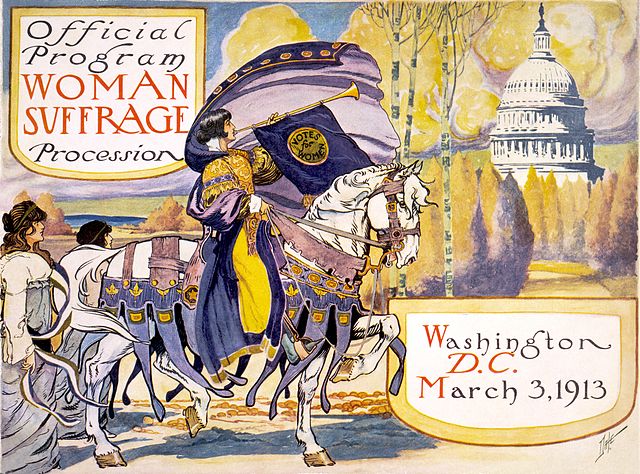1982: Women’s Rights and the ERA

In a year of artistic contrasts, Michael Jackson released Thriller (considered the best-selling album worldwide), Cats premiered on Broadway (and would become one of the longest-running Broadway musicals ever), Gabriel García Marquéz received the Nobel Prize in Literature, and movies that opened included E.T.—The Extra-Terrestrial, Gandhi, Tootsie, and The Verdict. The punk and alternative music scenes included new releases by the Dead Kennedys, the Violent Femmes, the Replacements, and Laurie Anderson. Ozzy Ozbourne infamously bit the head off a live bat onstage. Notable deaths in 1982 included John Belushi and Princess Grace of Monaco; in addition, John W. Hinckley, Jr. was found not guilty by reason of insanity of attempting to assassinate President Reagan the prior year.
1982 was also the year the Equal Rights Amendment (ERA) to the Constitution failed ratification. The ERA was first written in 1923 by suffragette Alice Paul and introduced to Congress yearly between 1923 and 1972, when it was passed in Congress and sent to the states for ratification. By the 1982 deadline, the ERA had been ratified by 35 states, just three states short of the 38 required to amend the Constitution to introduce it. The amendment’s text read:
“Section 1. Equality of rights under the law shall not be denied or abridged by the United States or by any state on account of sex.
“Section 2. The Congress shall have the power to enforce, by appropriate legislation, the provisions of this article.
“Section 3. This amendment shall take effect two years after the date of ratification.”
What were freshmen college students thinking about issues related to women’s equality in 1982 when the ERA failed ratification at the state level? The CIRP Freshman Survey asked a number of viewpoint questions that shed at least some light on their opinions. These included “The activities of married women are best confined to the home and family,” “Abortion should be legalized” (though Roe v. Wade legalized abortion in 1973, state efforts to further restrict abortion continued in 1982), “Divorce laws should be liberalized,” and “Women should receive the same salaries and opportunities for advancement as men in comparable positions.” Taking these questions as a group allows some insight into freshmen’s views on aspects of women’s equality: wage and advancement equality, reproductive freedom, freedom within marriage, and freedom to divorce.
Overall, freshmen in 1982 overwhelmingly supported women receiving the same salaries and opportunities to advance as men in comparable jobs; 93.8% agreed either “somewhat” or “strongly,” with 71.5% agreeing “strongly.” When broken down by gender, 88% of female students agreed “strongly” and 9.3% agreed “somewhat,” for a total of 97.3%. A lower percentage of male students agreed “strongly” (53.9%), but a total of 90.1% agreed either “strongly” or “somewhat” with the statement “Women should receive the same salaries and opportunities for advancement as men in comparable positions.”
This also held true across political viewpoints. For example, 82.6% of students who identified themselves as politically far right agreed either “somewhat” or “strongly” that “Women should receive the same salaries and opportunities for advancement as men in comparable positions.” This agreement was shared by 92.6% of students identifying as politically conservative, 94.2% of students identifying as middle-of-the-road politically, 95.4% of students identifying as liberal, and 89.7% of students identifying as far left politically.
However, answers to the other social issue questions were more evenly distributed. For instance, when asked their opinion on the statement “The activities of married women are best confined to the home and family,” 22.3% of all students agreed either “somewhat” or “strongly”; 49.8% of students disagreed “strongly,” with another 27.9% disagreeing “somewhat” for a total of 77.7% in disagreement. When broken down by gender, 8.4% of male students agreed “strongly” and another 21.7% agreed “somewhat” to yield a total of 30.1% agreeing either “strongly” or “somewhat.” By contrast, 66.6% of female students disagreed “strongly” and another 18.4% disagreed “somewhat,” totaling 85% in disagreement.
Students’ opinions on “Abortion should be legalized” were even more mixed. A total of 57.2% overall agreed either “strongly” or “somewhat.” When analyzed by gender, 58.9% of female students and 55.4% of male students also agreed either “strongly” or “somewhat.” Analysis by students’ self-identified religious status also yielded, unsurprisingly given different religions’ stances on the subject, varying results. (In 1982 “Protestant,” “Roman Catholic,” “Jewish,” “other” and “none” were the only response options.) For instance, 88.2% of students identifying as Jewish agreed “strongly” or “somewhat” that abortion should be legalized; this was higher than all other religions and slightly higher than the 84.5% of students identifying religion as “none” who agreed either “strongly” or “somewhat.” However, 61.9% of Protestant students, 60.4% of students identifying with “other” religions, and 41% of Roman Catholic students also agreed either “strongly” or “somewhat” that abortion should be legalized.
The question of “Divorce laws should be liberalized” also yielded less overwhelmingly one-sided responses than the question regarding wage and promotion equality for women. To put this question into historical context, by 1982 no-fault divorce laws (where one party did not have to prove the other guilty of fault such as infidelity) had been enacted in all but three states (MD, SD, and UT), though Ohio had just passed no-fault laws in 1982 and Pennsylvania in 1980. That being said, only 7.8% of students agreed “strongly” that divorce laws should be liberalized; another 33.6% agreed “somewhat” for a total of 41.4% agreeing either “strongly” or “somewhat.” The collective responses to these questions suggest overwhelming support by college freshmen in 1982 for women to be paid equally to and allowed to compete equally for promotions with men holding comparable jobs but more mixed support for women’s reproductive freedom, freedom within marriage, and freedom to divorce. In a testimony to the continued relevance of this issue, women’s rights advocates today continue to work for the passage of the ERA.
Did you know?: 51.3% of college freshmen respondents in 1982 had “frequently” attended a religious service the previous year.
14% had “frequently” written a computer program the previous year.
21.2% reported qualifying for a Pell Grant (whether or not they completed applying for it).
